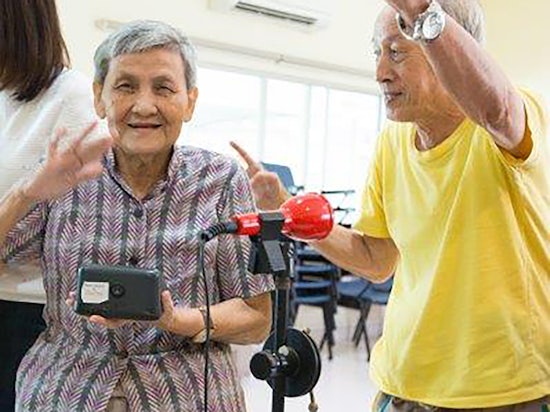‘Fresh Hope’ for people with dementia with launch of new pilot program
An Australian-first pilot program has been launched as part of an announced partnership between aged care provider Fresh Hope Care, I’m Soul Inc, and Western Sydney University.

Seniors at St John’s Home Making Music (Source: Fresh Hope Care)
The partnership between the three organisations is driving the pilot program, at Fresh Hope Care’s Pendle Hill site, which is all about helping dementia patients engage through the making of music.
Fresh Hope Care Executive Director Natalie Cook says the pilot program aims to serve as a way to delivering better patient outcomes, quality of life and research data that will optimise care for people suffering from cognitive decline.
All three organisations believe the learnings from the pilot will heighten the industry’s ability to deliver services to those who have physical or cognitive impairments.
“We are on a journey to stretch ourselves to deliver things that were once though improbable,” Ms Cook says.
“This team has a real heart for those we care for, particularly the really vulnerable.
“We are committed to taking the time to realise new ways to serve them.”
I’m Soul Inc Founder and Chief Executive Officer (CEO) Michelle Lee says she is excited about the collaboration with Fresh Hope Care and Western Sydney University.
“Our enabling music programmes are designed to help anyone to make music, with no previous experience required,” she says.
“There are no limits to age or ability.
“Making music is like a full mind-body-soul workout. It magnifies the therapeutic impact of music, far beyond just listening.
“You forget what you ‘can’t do’ – it rewires the brain.”
Ms Lee says the ability to make music can also benefit many other people too.
“Most people do not know that music triggers the release of chemicals such as dopamine and oxytocin in our brains that makes us feel happy and closer to others,” she continues.
“This program is built for teams and is therefore helping to solve loneliness.
“It’s about the program, not just the tech.”
The project will be funded through funding recently received by Western Sydney University from the New South Wales Department of Family and Community Services.
Dr Jennifer MacRitchie from The MARCS Institute for Brain, Behaviour and Development at Western Sydney University says neuroscience research points to music making as one of the few activities that stimulates and uses the entire brain.
Noting that it is also known to help increase the growth of new brain cells, which is critical for enhancing positivity and for rehabilitation of disorders such as stroke and dementia.
“There is great potential to use a system like this and really look at how it improves the quality of life for residents,” Dr MacRitchie says about the new pilot.










